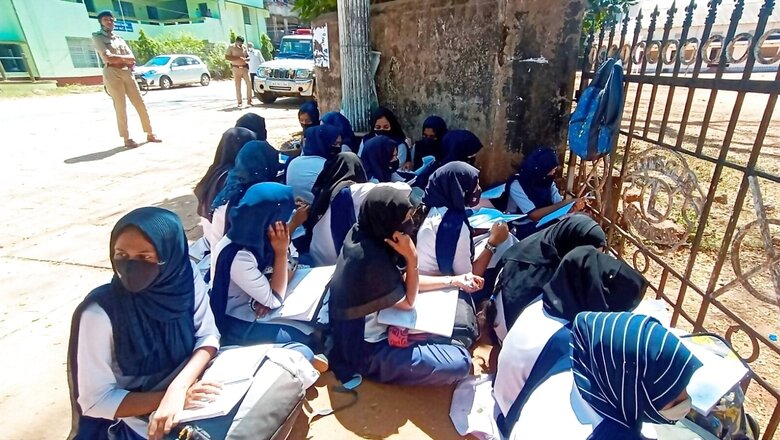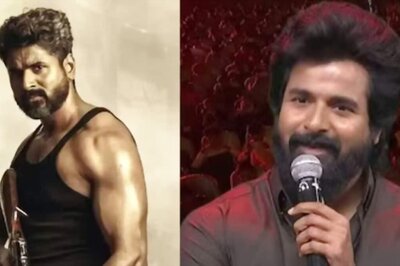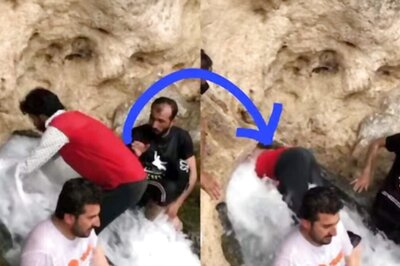
views
A month ago on January 1, a group of students from a government pre-university college in Karnataka alleged that they were denied entry to their classrooms for wearing hijab. The issue was catapulted into the spotlight when similar incidents were reported from other such government-run educational institutions in different parts of the state, most specifically coastal Karnataka.
At the Kundapur pre-university college, a highlight in the ongoing controversy, a group of boys came to college wearing saffron shawls as a “counter” to hijab-clad girls. This triggered a slew of apparent standoffs, in many cases reportedly fuelled by right-wing outfits, at colleges in Udupi and Dakshin Kannada districts.
Soon, the issue gained national importance with political leaders making statements for and against. The BJP-ruled Karnataka government has, in fact, said strict “dress code” must be followed in colleges as well as other educational institutions, and that there is “no place for religious symbols in educational institutions”.
Not only this, there are reports of agitations, stone pelting and use of force by police, with the Karnataka government suspending classes for three days at all educational institutions. As on Wednesday, the Karnataka High Court is hearing a petition against the ban on headscarves at educational institutions.
Here’s a comprehensive timeline of the events in the ongoing hijab controversy, aftershocks of which have been felt in southern Puducherry, and as far as Madhya Pradesh and Delhi:
February 9: The single-judge bench of the Karnataka HC hearing the case related to the hijab ban in school-college campuses referred the matter to the Chief Justice Ritu Raj Awasthi, with a view that the CJ may decide on forming a larger bench to look into the case.
Justice Krishna S Dixit, who was hearing a batch of petitions against the ban on headscarves in classrooms since Tuesday, maintained that these matters give rise to certain constitutional questions of seminal importance in view of certain aspects of personal law.
February 9: Earlier in the day, the Karnataka cabinet decided to wait for the HC verdict before taking any further decision on the matter.
February 9: The BJP government in Madhya Pradesh also clarified that there was no proposal to ban hijab in educational institutions in the state under consideration even as state school education minister Inder Singh Parmar, who had backed hijab ban and proposed a dress code in schools, said his statement was “wrongly interpreted”.
February 8: A students’ outfit at Delhi University protested against hijab restrictions in a government pre-university college in Udupi in Karnataka. The Muslim Students’ Federation protested outside the arts faculty in DU North Campus. The gathering comprised 50 students, including women, who were wearing hijabs.
Visuals of a group of boys heckling a hijab-clad girl in Mandya, near Bengaluru, went viral. The student, who asserted that the protest demanding the girls’ right to wear hijab would continue, said she had the support of her teachers and claimed that the boys with saffron shawls who heckled her were “outsiders.”
February 8: Protests erupted at Mahatma Gandhi Memorial College in Udupi after a large group of students wearing saffron stoles and headgears raised slogans in the college campus while hijab-clad Muslim girls were staging a protest demanding justice. Tension prevailed at some educational institutions in Udupi, Shivamogga and Bagalkote, forcing the police and authorities to intervene.
Some students even tried hoisting a saffron flag at the college premises in Shivamogga. Protests by students were also reported at educational institutions in districts of Vijayapura, Gadag, Dakshina Kannada, Davangere and Chitradurga.
The Karnataka HC and chief minister Basavaraj Bommai appealed to all students and people to maintain peace and calm. Spreading out as far as Madhya Pradesh, a minister from the BJP-ruled state said hijab was not part of the uniform and therefore it should be banned. School Education Minister Inder Singh Parmar said a “dress code” will be implemented in schools in the state to ensure that a sense of equality prevails among students.
February 8: The Karnataka government declared three-day holiday for educational institutions across the state.
The Puducherry government’s directorate of school education also asked the head of a government school in Ariyankuppam to inquire into the incident of alleged objection by a teacher to a Muslim girl wearing hijab while attending classes.
February 7: In junior colleges at Kundapur in Karnataka’s Udupi district, students tried defying government order mandating uniforms stipulated by the state government or respective managements of the institutions. A group of students studying at Venkataramana College in Kundapur came in a procession to the college wearing saffron shawls. They were prevented from entering the premises by the college principal and police.
At the Government PU College in Kundapur, too, the principal talked to Muslim girl students who came wearing hijabs and explained to them the government’s order. As the students continued to insist on wearing the headscarves, they were asked to go to a separate room arranged for them.
Three hijab-clad students came to Kalavara Varadaraj Government College at Koteshwara in Udupi. To counter them, other students put on saffron scarves as a sign of protest.
February 5: Karnataka BJP state chief Nalin Kumar Kateel said the state government will not allow “Talibanisation” of the education system. On the other hand, Congress leader Rahul Gandhi came out in support of the Muslim girl students on his Twitter, saying, “hijab come in the way of their education, we are robbing the future of the daughters of India. Ma Saraswati gives knowledge to all. She doesn’t differentiate. #SaraswatiPuja.”
February 4: The echoes of the controversy were felt in Tamil Nadu, too, as DMK MP Senthil Kumar raised the issue in Parliament and sought why students wearing hijab were not being allowed to attend classes. He urged the central government to take action in the matter.
February 3: Back in Kundapur, the highlight of the ongoing controversy, Bhandarkars’ Arts and Science College was forced to close its gates on students after the protests spread there.
February 2: Videos of hijab-clad girls pleading with their principal at Kundapur Government PU College went viral. The college stopped the entry of students wearing hijab after Hindu students donned saffron shawls. The hijab row also broke out at Bhadravati in Karnataka’s Shivamogga district on the same day.
January 31: One of the Muslim girl students denied entry into her classroom filed a writ petition before the Karnataka HC, saying wearing a headscarf was her fundamental right.
January 3: Students from a government-run college in Karnataka’s Koppa district wore saffron shawls to counter Muslim girls wearing hijab inside the classroom.
January 1: The issue first surfaced when Muslim girl students from a government-run pre-university college in Udupi district alleged that they were denied entry into the classroom for wearing hijab.
(With PTI inputs)
Read all the Latest India News here




















Comments
0 comment